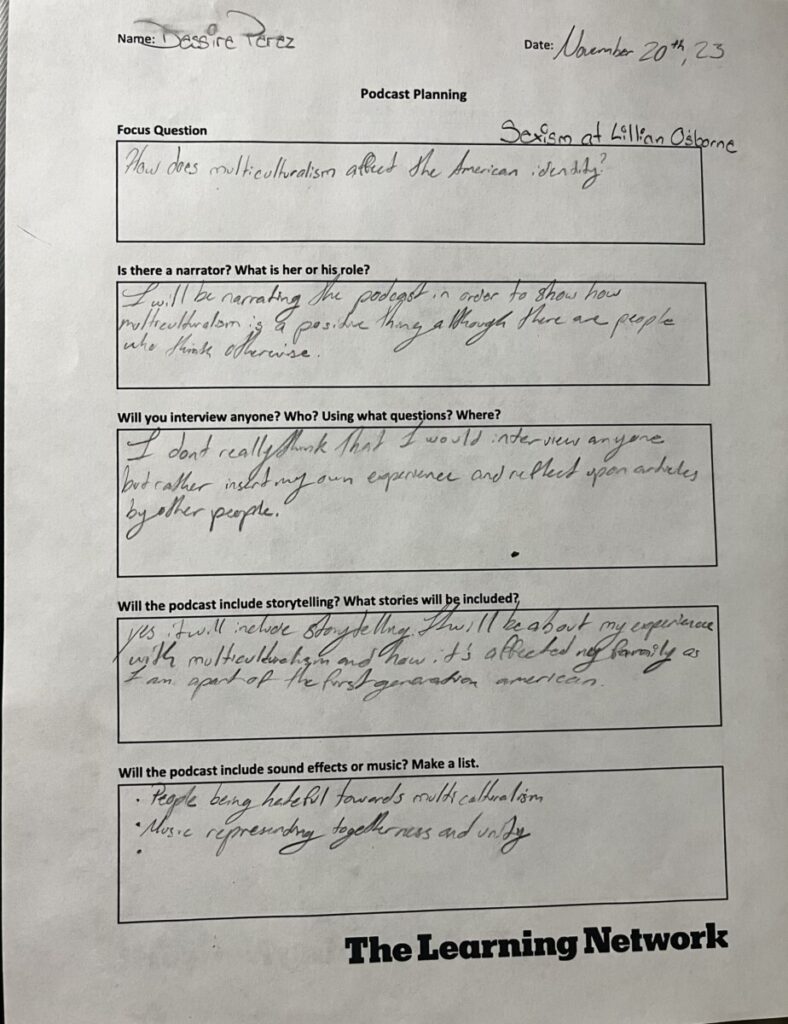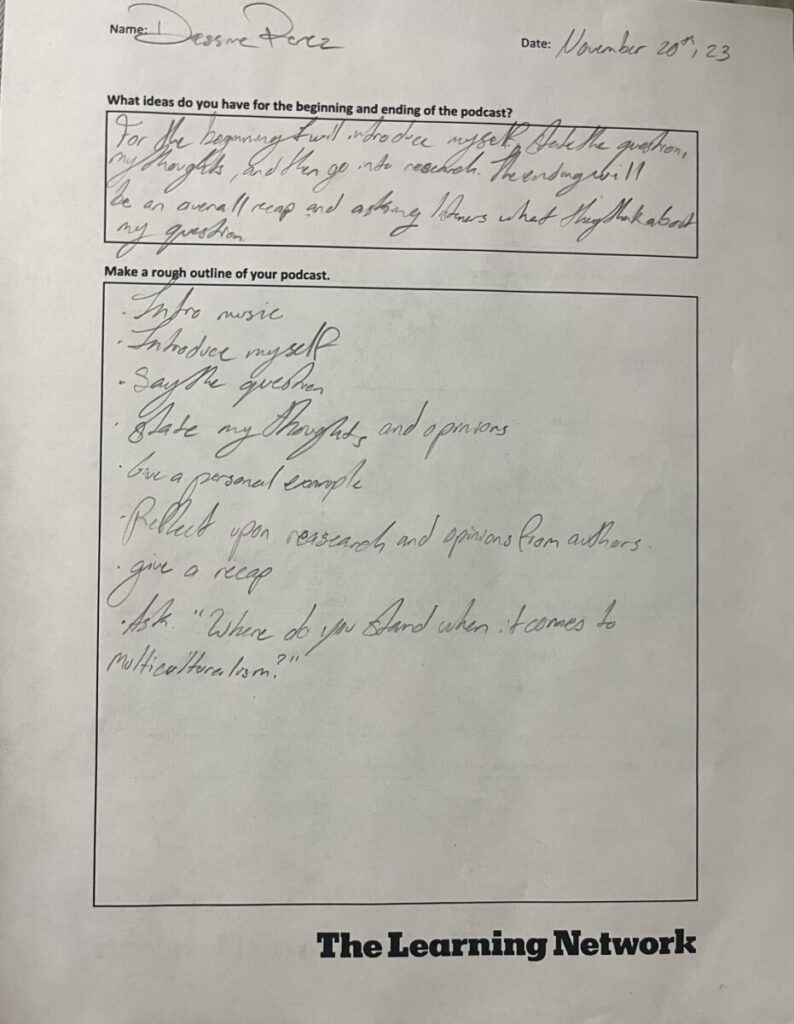This is a Informational/Interview/Personal Narrative podcast.
I. The Intro:
In the beginning of my podcast, I am going to come in with intro music. The intro will be clips of public speakers talking about multiculturalism. After this I will introduce myself and my topic (“How does Multiculturalism affect the American Identity?”). Once I have done this, I will ask listeners to think about their opinions on this topic, keep an open mind throughout and reflect on their initial thoughts at the end of the podcast. Now I begin to go into the middle part of the podcast.
(Hey, my name is Dessire Perez, and this is “Crossing All Cultures.” Today’s topic about how Multiculturalism affects the American Identity. I ask you to really think about what this means to you and keep an open mind throughout today’s podcast. I will have guest speaker Daniela Cabral and responses from Ilan Stavans, and Mike Pomepo joining me here today. Remember, multiculturalism is the concept of people from different races, ethnicities, and nationalities living together in the same community. Now let’s get into it…)
II. The Middle Part:
- 1 – First off let me start by introducing Ilan Stavans. He is the Lewis-Sebring professor at Amherst College, a consultant to the Oxford English Dictionary and an author. Stavans says “The English language — or maybe we should just call it American — has borrowed from others to name the foods so many of us love. Italians gave us “pizza” and “spaghetti,” and we borrowed “taco,” “burrito” and “churro” from the Spanish language. Chinese immigrants introduced us to chopsticks, while the ketchup we drown our hot dogs, burgers, and fries in is believed to have derived from a Chinese word. Irish immigrants introduced us to “hooligan,” “phony” and “galore,” and from Yiddish we got the words “chutzpah” and “schlep.” The terms “diva,” “tornado” and “tycoon” came from other languages, too.” If you think about it, there is many more American words that come from other countries. I’ve also realized that there are many Spanish words that also translate the same in English. There are words like chocolate, hospital, idea, funeral, inevitable and so on that mean the same thing in both languages. Now if you think about it, multiculturalism hasn’t been such a terrible thing.
- 2 – Now there are people like secretary of state, Mike Pompeo, who think otherwise. Pompeo says “Woke-ism, multiculturalism, all the -isms — they’re not who America is. They distort our glorious founding and what this country is all about. Our enemies stoke these divisions because they know they make us weaker.” He’s essentially created this ideology that multiculturalism is brainwashing Americans into uplifting the enemies (or more so, other cultures). He is firmly against the impact that has happened and has created controversy on this topic.
- 3 – Now let me introduce someone very dear to me, my cousin, Daniela Cabral. Daniela has moved from the Dominican Republic at the age of 7 and will be telling us today about her perspective on how the “American Life” has changed throughout the years.
- 4 – “Tell me about your personal experience with the shift that has occurred from your Dominican Culture to American culture.”
- 5 – I will ask her “What do you think about the impact that other cultures have on America?”
- 6 – I will ask her “In what way do you think Americans may perceive multiculturalism to have negatively impacted this country and if she agrees or disagrees with this allegation?”
- 7 – I will tell people about how my experience with being Dominican and American has been.
- 8 – I will talk about how when I went to high school, I saw so many students from distinct cultures who identified as American.
- 9 – I will talk about the shift that occurred when I met others from different countries and how my definition of “what being American is” has changed.
- 10 – I will talk about my point of view on multiculturalism after getting insight from other people.
III. The Outro:
In the conclusion I will ask listeners “How do you feel about multiculturalism now?” I will ask that listeners share their stories on how they themselves or someone that they know has experienced multiculturalism. I will proceed with clips containing sounds of unity within a group of people as well as a sense of togetherness.
(How do you feel about Multiculturalism now? Do you feel that it has been an asset to your life? Or do you feel otherwise? I hope that you too decide to share your story or someone who you know has been affected. I hope to see more people supporting multiculturalism and that it is not seen as a negative. That’s all for today and see you all in the next episode. Goodbye for now!)






What about at the ending — ask your interviewee What would be a good way to solve the negative aspects that she encountered — and what is the future of America? Riff on this as a closing — make a call to action or end with a thought provoking question. How can we make the mutlicultural ID and diversity a source of strength and celebration for America? not a source of division?